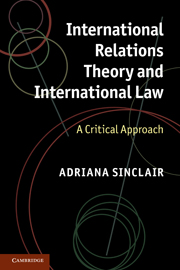Book contents
- Frontmatter
- Contents
- Acknowledgements
- Introduction
- 1 The theoretical foundations of constructivism and its treatment of law
- 2 Challenging the common sense idea of law
- 3 Introducing critical jurisprudence
- 4 Brown, desegregation and racism in America
- 5 Constructing rape
- 6 Law and normative backsliding
- Conclusion
- Bibliography
- Index
Conclusion
Published online by Cambridge University Press: 05 June 2012
- Frontmatter
- Contents
- Acknowledgements
- Introduction
- 1 The theoretical foundations of constructivism and its treatment of law
- 2 Challenging the common sense idea of law
- 3 Introducing critical jurisprudence
- 4 Brown, desegregation and racism in America
- 5 Constructing rape
- 6 Law and normative backsliding
- Conclusion
- Bibliography
- Index
Summary
And so we end this book where it began: with constructivism. Constructivism has been the bedrock of this book as IR theory’s best effort to understand law. Existing IR theory attempts at conceptualising international law, and by implication, law in a generic sense, suffer from a number of flaws as I see it. First, such accounts tend to adopt an ‘issue-area’ approach, that is, outlining the relevant international law and legal controversies for particular issues areas, like the use of force, or the environment. Often these chapters are sandwiched between an exposition of the realist, liberal institutionalist and possibly constructivist view of law and a conclusion reminding us of the ‘politics of international law’. Such accounts suffer from two flaws. First, in framing any understanding of international law within a broader understanding of the ‘politics of international law’, politics remain supreme. By this I mean that politics is depicted as the question that matters; the task for IR theorists is to gain some familiarity with the parameters of international law, and some of the individual rules, but the explanation is to be found in politics. This creates a tendency to ‘cherry-pick’: to import specific international legal rules into political debates. The law functions as little more than a tool to be deployed in a wider, and more important, political game. And this focus on individual international legal rules creates a subsidiary flaw: by focusing on specific laws, we separate them off from the rest of the international legal structure. We also fail to see the context of international law. This can be its social, political or economic context, or its historical context. Instead, all we see is one individual rule. The effect of this is that ‘[l]egal ideology becomes a tree cut off at the trunk, the better to study each branch, twig and leaf, and to compare it with other trees brought from afar’. Or in Kennedy’s happy phrase, ‘the endless attention to trees at the expense of forests’. Such an approach also minimises our capacity to see and ask broader questions about the nature of all law, be it domestic or international. It is precisely these theoretical, or maybe I should say jurisprudential, questions that need to be addressed. Only by doing so will IR theorists truly understand the nature of law.
- Type
- Chapter
- Information
- International Relations Theory and International LawA Critical Approach, pp. 170 - 175Publisher: Cambridge University PressPrint publication year: 2010



